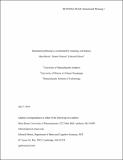| dc.contributor.author | Breen, Mara | |
| dc.contributor.author | Watson, Duane | |
| dc.contributor.author | Gibson, Edward A. | |
| dc.date.accessioned | 2012-10-15T19:15:59Z | |
| dc.date.available | 2012-10-15T19:15:59Z | |
| dc.date.issued | 2010-09 | |
| dc.date.submitted | 2010-07 | |
| dc.identifier.issn | 0169-0965 | |
| dc.identifier.issn | 1464-0732 | |
| dc.identifier.uri | http://hdl.handle.net/1721.1/73986 | |
| dc.description.abstract | This paper evaluates two classes of hypotheses about how people prosodically segment utterances: (1) meaning-based proposals, with a focus on Watson and Gibson's (2004) proposal, according to which speakers tend to produce boundaries before and after long constituents; and (2) balancing proposals, according to which speakers tend to produce boundaries at evenly spaced intervals. In order to evaluate these proposals, we elicited naïve speakers’ productions of sentences systematically varying in the length of three postverbal constituents: a direct object, an indirect object (a prepositional phrase), and a verb phrase modifier, as in the sentence, The teacher assigned the chapter (on local history) to the students (of social science) yesterday/before the first midterm exam. Mixed-effects modelling was used to analyse the pattern of prosodic boundaries in these sentences, where boundaries were defined either in terms of acoustic measures (word duration and silence) or following the ToBI (Tones and Break Indices) prosodic annotation scheme. Watson and Gibson's (2004) meaning-based proposal, with the additional constraint that boundary predictions are evaluated with respect to local sentence context rather than the entire sentence, significantly outperformed the balancing alternatives. | en_US |
| dc.description.sponsorship | National Science Foundation (U.S.) (Grant No. 0218605) | en_US |
| dc.language.iso | en_US | |
| dc.publisher | Taylor & Francis Group | en_US |
| dc.relation.isversionof | http://dx.doi.org/10.1080/01690965.2010.508878 | en_US |
| dc.rights | Creative Commons Attribution-Noncommercial-Share Alike 3.0 | en_US |
| dc.rights.uri | http://creativecommons.org/licenses/by-nc-sa/3.0/ | en_US |
| dc.source | Gibson via Courtney Crummett | en_US |
| dc.title | Intonational phrasing is constrained by meaning, not balance | en_US |
| dc.type | Article | en_US |
| dc.identifier.citation | Breen, Mara, Duane G. Watson, and Edward Gibson. “Intonational Phrasing Is Constrained by Meaning, Not Balance.” Language and Cognitive Processes 26.10 (2011): 1532–1562. Web. | en_US |
| dc.contributor.department | Massachusetts Institute of Technology. Department of Brain and Cognitive Sciences | en_US |
| dc.contributor.approver | Gibson, Edward A. | |
| dc.contributor.mitauthor | Gibson, Edward A. | |
| dc.relation.journal | Language and Cognitive Processes | en_US |
| dc.eprint.version | Author's final manuscript | en_US |
| dc.type.uri | http://purl.org/eprint/type/JournalArticle | en_US |
| eprint.status | http://purl.org/eprint/status/PeerReviewed | en_US |
| dspace.orderedauthors | Breen, Mara; Watson, Duane G.; Gibson, Edward | en |
| dc.identifier.orcid | https://orcid.org/0000-0002-5912-883X | |
| mit.license | OPEN_ACCESS_POLICY | en_US |
| mit.metadata.status | Complete | |
